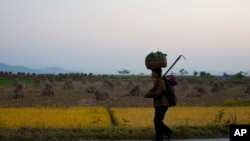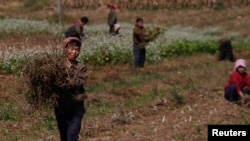Two U.N. agencies warned Friday that more than 10 million people in North Korea are facing severe food shortages because the recent harvest was the worst in a decade.
The World Food Program (WFP) and the Food and Agriculture Organization (FAO) said a combination of weather conditions and limited supplies of fuel, fertilizer and other agricultural inputs have resulted in a harvest of less than 5 million tons. For the past 10 years, total crop production has not fallen below the 5 million-ton level.
Prospects for crops that will be harvested in June are not promising, because of a widespread lack of rainfall and a lack of snow cover, which experts say left crops exposed to freezing temperatures during the winter.
The U.N. said that annually, 11 million people, or 43 percent of North Korea's population, are undernourished.
In addition to having less to eat, there are also shortages of certain types of nutrient-rich foods.
Little protein
"Our assessment showed that there are some people getting so little protein in their diet that they are eating eggs and other protein maybe several times a year," WFP spokesman Steve Taravella told VOA. "So it's not just quantity but diversity of diet that is of real concern right now."
The diet of the average North Korean lacks vital vitamins, minerals, proteins and fats, and consists mainly of rice, maize or potatoes, and kimchi (pickled cabbage) or other vegetables when they are available.
The FAO is concerned about wheat, barley and potato shortages, which are key staples during the lean season, which begins in May and runs through September.
Many urban families rely on their rural relatives to improve their access to food, but the U.N. assessment warned that rural families are also facing food shortages this year.
The agencies also found that the government's public distribution system, on which many North Koreans rely, has been forced to cut rations to the lowest level ever for this time of year. Since January, rations have been reduced to 300 grams per person per day, compared with 380 grams at the same time last year. The U.N. warned rations could be cut further during the peak lean season, without substantial external assistance.
Effects of sanctions
The international community has imposed increasingly tighter economic sanctions on North Korea in the past two years in a bid to get it to give up its illicit nuclear weapons program. While U.N. Security Council sanctions are not intended to hurt the civilian population, WFP spokesman Taravella said sometimes sanctions have unintended consequences and in North Korea, food production has been affected.
"Yes, we have experienced indirect implications of the sanctions, things like ship owners being more reluctant to send vessels to DPRK because of the now-lengthier cargo inspections and possible fines," he said, referring to North Korea by its acronym. "So that means there have been delays in getting vital goods, including food assistance, into the country."
Despite a thaw in relations between the United States and North Korea resulting in two summits between their leaders in the past year, the international community has not eased sanctions, choosing to wait to see progress on denuclearization from Pyongyang first.
The World Food Program provides nutrition assistance to 770,000 malnourished women and children across nine North Korean provinces. It needs $28.5 million this year to continue its work. The Food and Agriculture Organization supports more than a half-million cooperative farmers with agricultural inputs, techniques and technologies to improve their crop yields.






